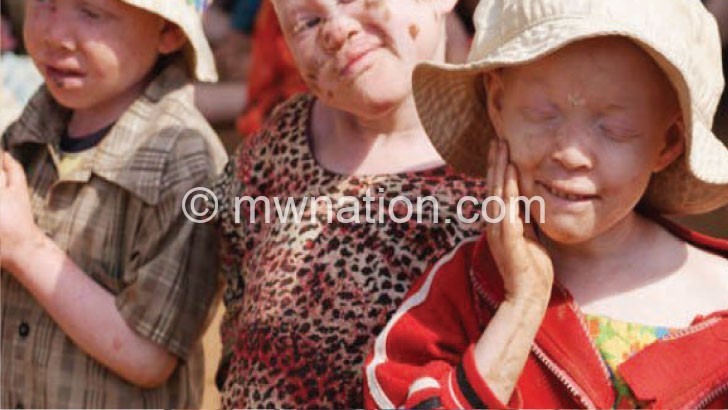‘We are still insecure’
Being a person with albinism leaves you under siege everywhere you go, says Ethel Mazanjo, 28.
The young woman, from Chilaweni Village, Traditional Authority Machinjiri in Blantyre, says her freedom of movement has been severely restricted by killings of people born with a pale skin like hers.
Despite a drop in the frequency of the attacks dating back to 2014, she says her skin condition is a matter of life or death because persons with a condition like hers are being hunted for their bones.
“They call us money because they believe that once they get us, they will be rich,” she says.

Mazanjo says her home has been attacked more than once.
For her, even getting married is not easy.
“It is not easy to know who has come for your body parts in the name of love. You never know whether the man really loves you as a person or wants your body parts for sale. We have heard numerous stories of our friends attacked by relatives and people they trust, people who were supposed to protect you. What about someone you do not know? This is the reason I feel somehow secure without a husband,” she says.
There are eight children in Mazanjo’s family and three girls and two boys have albinism.
She has a certificate in typing, but cannot get employment. Thanks to her passion for empowerment of marginalised communities, she has opened a nursery school to give children with disability a solid start in life.There are about 62 children at the school.
“All children learn free of charge because I want to assist my fellow persons with disability. However, things are not right financially. I struggle to source porridge for them. How I wish well-wishers helped me,” says Mazanjo.
She is also worried about her jobless brother, Willard, a qualified driver.
“Former president late Bingu wa Mutharika employed him as a driver at his Ndata Farm in Thyolo. But after the president’s death [in April 2012, my brother became jobless. He has been to several companies, but they tell him that he cannot drive properly being an albino,” says Mazanjo.
Early this month, Centre for Human Rights and Rehabilitation (CHRR) and Centre for the Development of People (Cedep) held a stakeholders meeting on the rights and plight of persons with albinism and the elderly.
Zione Lapani, from Blantyre Police Station, assured persons with albinism that the security agency is committed to protect the at-risk population.
The police officer showed the audience an alarm gadget a person with albinism is expected to activate when in danger.
“Neighbours are made aware about it so that when they hear the alarm, they should rush to the scene to protect the person under attack,” she said.
But Mazanjo feels that government needs to do more because alarms can fail.
“What about when that person is attacked while asleep? How will they be able to activate the alarm? Again, as women, we have to put it in a handbag. What will happen if we have been ambushed? This cannot work,” she says.
Mzuzu University (Mzuni) security studies lecturer Eugenio Njoloma agrees that such gadgets can be ineffective when it matters most.
“The idea might have been good, but it falls short on response. Assuming a person activates the alarm, how rapid is the response? If the gadget has been activated and the response is slow, then the chance of being killed is high,” he explains.
Njoloma says changing people’s attitudes and understanding is the best security for people with albinism.
“Do body parts of people with albinism really bring fortune? Assuming they do, is it right and proper to kill to get rich? These are some of the messages which should be included in awareness campaigns,” he says.
Njoloma also notes that poverty plays a bigger part in albinos’ killings as people have shown that they can do anything, including killing, to get rich. He says government should prepare intervention measures to fight poverty which will stop them from killing for money.
“Intervention measures happen when there is political will. But when some people connected to government have their names mentioned as allegedly being involved, it becomes tough. However, that is the only way killings and abductions of people with albinism can stop,” he says.
Recently, a woman with albinism in Mzimba had her three toes chopped in an attack that marks the resurfacing of the problem which simmered down after May 2019 Tripartite Elections.
CHRR has intensified the campaign against people with albinism.
“Our research has shown that these killings happen during election periods and we are not surprised that the malpractice has started again. We have mobilised traditional and faith leaders to help in the battle,” says CHRR programmes manager Michael Kaiyatsa.





